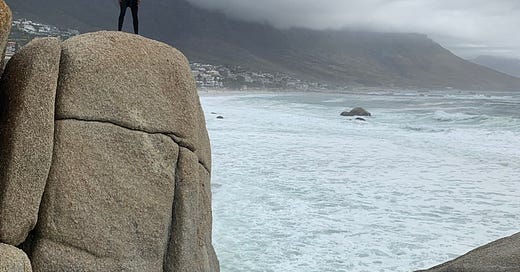Hello and welcome if you are new to, from the desk of Rachel Leeke!
This newsletter is where I share weekly observations on two important forces in my life: love + travel.
In addition to narratives, I provide tools to support you in creating the confident, loving, and adventurous life you deserve.
Read up on my last newsletter about why I’d make Iceland my home here or the entirety of my work here.
Thank you to my paid subscribers
, , C. Foster, and L. Craig.If you find value in my offerings, would like to tangibly support my work, but, are unable to commit to a subscription at this time, consider buying me a coffee or purchasing a book for my library.
I have a day job, and at work, I cover my hair.
It's an everyday necessity in sterile environments.
The official name of the protectant is a disposable bouffant cap, but it most often goes by hair net to the initiated.
It's blue, made of a lightweight, lint-free material, and has a cinched elastic band around the opening to stay put once placed on one's crown. While described as breathable, it is incredibly drying to my hair, so underneath it, I wear a silk bonnet to protect my curls from its moisture-sucking necessity.
You know the type. It's the kind worn to bed at night or grabbed quickly and secured under a hoodie to begrudgingly return to the beauty supply store after you swore you got enough packs of hair but, alas, didn't.
Virtually all the black women at my job wear some barrier between their strands and the friction of mandated policy. Our hair is delicate. Without moisture, we run the risk of damage and breakage. For protection, strength, and longevity, our strands require a buffer that cannot touch the real us even if, from the outside, the threat is all-consuming.
I realized the sheer scale of that threat when matriculating to university.
While the presence of Black students was small in the context of the overall student body, Black people in service to the university had an outsized presence. Their ebony skin stood out against the ivory towers of education they upheld.
And they did so day in and day out. They were the food service providers in the dining hall, drove the buses that transported us to class, cleaned the hallways and common areas of our dorms, and maintained the landscape and sidewalks by manicuring lawns and removing snow when walkways became blanketed by obstructive beauty.
I can count the number of Black professors I had outside of diaspora studies, on one hand, but I witnessed countless individuals of color who kept the great engine of academia running daily.
Another time the threat reared its head was after enjoying what was, up until then, a lovely dinner on Long Street in Cape Town. The hostess who greeted me upon entry was Black. The server who brought me food, water, wine, and another glass of wine was Black. The busboy who cleared my plates, passed a crumber over the lily-white tablecloth, and relit the candle at the center of the table was Black. But the hand that emerged from some previously hidden corner of the dining room to extend the bill and await payment was the color of coconut meat but lacked the nourishment and vitality the tropical fruit provides.
You see, the elements against us and our moisturized beings aren't just heat, friction, and atmospheric free radicals. It's society's projections, systemic disenfranchisement, and the blood lust of boxing in that which nature has set free. It's consistently seeing those who look like you in roles and spaces void of power. It's remembering that if you do not seek out new landscapes and inject some lubricant between you and the abrasive, moisture-sucking establishments of the world, you run the risk of damage. You are liable to bend until you break. A weight of humility comes with being miles from home but realizing the institutions were never left behind.
As Audre Lorde put it best, if I don't define myself, I will be crunched into other people's fantasies for me and eaten alive.
This is why I travel.
To find land where freedom exists outside of my state of mind.
May you roam free today, and every day.
I love you,
RL
LET ME KNOW:
Did you go to university? Was it a PWI, HBCU, etc?
Have you ever felt like you got hit with a bait and switch while having services rendered?
What’s a staple in your beauty rotation?
Do you wear a du-rag, headtie, bonnet, wave cap, or something of the like to sleep at night?
The theme of belonging is central in my writing, here’s more on the topic:
-Guests in my home
-Choosing connection over perfection
-Feeling weightless in the gym
-The freedom of boundaries





Okay, Rachel, I wasn’t ready for this post to end. Can I say that? I wanted more of why you travel in spite of coconut meat experiences. I can soooo relate to your words. I went to a PWI, too. I sleep with a silk scarf on a satin pillowcase. I buffer myself with moisture to keep me soft despite a harsh world.
Nivea - you know the thick like Vaseline in the blue tub Nivea, I slather it all over my skin, two times a day; yes, I wrap my hair with a scarf when I wear hats and at night, and sometimes i wrap my head like the West Indian ladies just for a change in pace. Thanks for asking!